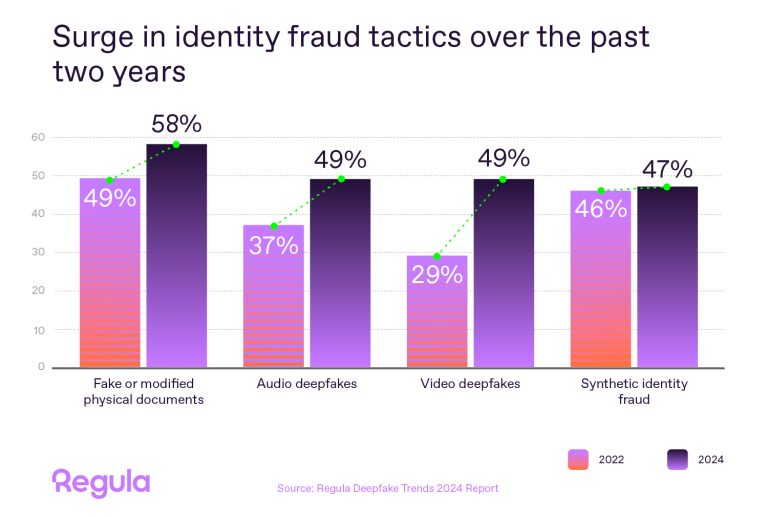A sharp rise in incidents of deepfake fraud has been reported by global businesses, according to a new survey. The study, commissioned by Regula, a leading developer of forensic devices and identity verification solutions, shows that half of the businesses surveyed worldwide have faced deepfake scams in the past two years.
The “Deepfake Trends 2024” report highlights a significant rise in both audio and video deepfake fraud. While incidents of audio deepfakes have increased by 12% since 2022, video deepfakes have surged by 20%. In 2022, 29% of businesses in countries such as Australia, France, and the US reported encountering video deepfakes. However, by 2024, this figure had risen to 49% in the US, UAE, Mexico, Singapore, and Germany.
Fraudsters use deepfake technology to create realistic yet entirely fabricated video and audio content, often impersonating individuals to deceive businesses. These AI-generated scams are becoming increasingly sophisticated, with global companies struggling to keep up.
The study also highlighted regional variations in the prevalence of deepfake incidents. Businesses in the UAE and Singapore have been particularly affected, with 56% of companies in both countries reporting encounters with video and audio deepfakes, respectively. This is significantly higher than the global average. In contrast, businesses in Mexico reported a relatively lower impact, with 35% encountering video deepfakes and 38% experiencing audio deepfakes.
There are also industry-specific trends, with audio deepfakes more prevalent in sectors such as Financial Services, Aviation, and Cryptocurrency, where more than half of the companies surveyed reported such incidents. On the other hand, video deepfakes have become a bigger problem in industries like Law Enforcement, Technology, and FinTech, where 56% to 57% of businesses have reported scams involving fabricated videos.
Despite the rising threat posed by deepfakes, traditional forms of fraud, such as the use of fake or altered documents, continue to be more widespread. According to Regula’s survey, 58% of businesses globally have experienced fraud involving fake or modified identity documents, making it the most common form of identity fraud. This type of fraud was especially prominent in Mexico (70%), the UAE (66%), the US (59%), and Germany (59%).
Interestingly, Singapore, which has seen a higher prevalence of deepfake fraud, reported a much lower incidence of fake or tampered documents, with only 43% of businesses there reporting such fraud.
Ihar Kliashchou, Chief Technology Officer at Regula, commented on the findings, stating: “The surge in deepfake incidents over the two-year period leaves businesses no choice but to adapt their current verification practices. Traditional methods are no longer enough. A liveness-centric approach, which involves verifying biometrics and physical ID documents in real-time, offers a more robust defence against these increasingly sophisticated threats.”
The findings from Regula’s survey emphasise the need for businesses to enhance their security and verification systems as deepfake fraud continues to grow globally. Further insights and updates on emerging threats will be released in due course as the company continues its analysis. Learn more at www.regulaforensics.com.


